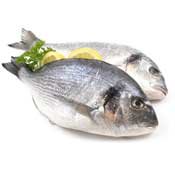As a child, one of my fondest memories was at the Audubon Aquarium in New Orleans when I was about 8. After I complained that all the creatures were behind glass, the penguin keeper surprised me with a wobbling baby penguin to touch and marvel over. Studying the bug-eyed rainbow trout and the menacing tiger shark made me squeal with delight.
Overfishing may soon eliminate many of these captivating creatures from our lives, reports Seafood Watch, a fish-friendly consumer program affiliated with the Monterey Bay Aquarium in Monterey, Calif.
The program aims to raise awareness about ocean issues and gives suggestions for safe seafood choices. The website (http://www.tinyurl.com/3s6asq9) has helpful information for consumers and businesses to reduce the fishing and consumption of endangered marine life. The site provides information to aid consumer's local ecosystems, including regional pocket guides identifying best seafood choices, good alternatives and seafood to avoid. The guides stress choosing domestic seafood and "fish caught or farmed using environmentally friendly practices."
Seafood Watch urges consumers to become involved in the fight for marine life. Individuals can send a pre-written letter to their senators, urging them to consider climate change and its affect on ocean wildlife. They can sign up for a monthly newsletter, which gives updates on current issues and conservation news. You'll even find free Seafood Watch apps for iPhones and Androids.
Closer to home, some aquariums have taken the initiative to become involved in the fight for endangered aquatic species. The Memphis Aquarium works internationally through their Conservation Action Network (http://www.memphiszoo.org/can), a non-profit organization that gives $25,000 to $40,000 grants each spring to worthy conservation projects.
The Audubon Aquarium in New Orleans (http://www.auduboninstitute.org) has established a species-survival zoo, including a "frozen zoo," which conserves certain genetic materials of endangered species.
Choose Wisely
Best Choices: These seafood choices are abundant, well managed and caught or farmed in environmentally friendly way.
Arctic Char (farmed)
Barramundi (U.S. farmed)
Catfish (U.S. farmed)
Clams, Mussels, Oysters (farmed)
Crab: Dungeness, Stone
Crayfish (U.S. farmed)
Croaker: Atlantic*
Halibut: Pacific (U.S.)
Lobster: Spiny (U.S.)
Mackerel King*, Spanish* (U.S.)
Mahi Mahi (U.S. Atlantic troll/pole)
Mullet: Striped
Salmon (Alaska wild)
Scallops (farmed off-bottom)
Striped Bass (farmed or wild*)
Tilapia (U.S. farmed)
Tuna: Albacore including canned white tuna (troll/pole, U.S. and BC)
Tuna: Skipjack including canned light tune (troll/pole)
Tuna: Yellowfin (U.S. Atlantic troll/pole)
Wreckfish
Good Alternatives: These are options, but environmentalists have some concerns with how they're caught or farmed, or with the health of their habitat.
Basa/Pangasius/Swai (farmed)
Caviar, Sturgeon (U.S. farmed)
Clams, Oysters (wild)
Crab: Blue*, King (U.S.), Snow
Herring: Atlantic
Lobster: American/Maine
Mahi Mahi/Dolphinfish (U.S.)
Pollock: Alaska
Red Porgy
Scallops: Sea
Shrimp (U.S,. Canada)
Snapper: Gray, Lane*, Mutton*, Yellowtail (U.S.)
Squid
Swordfish (U.S.)*
Tilapia (Central & South American farmed)
Tilefish (Mid-Atlantic)
Tuna: Canned white/Albacore (troll/pole except U.S .and B.C.)
Tuna: Yellowfin (troll/pole except U.S. Atlantic)
Wahoo*
Avoid: These fish are overfished or caught or farmed in ways that harm other marine life or the environment.
Caviar, Sturgeon* (imported wild)
Chilean Seabass/Toothfish*
Cod: Atlantic
Conch: Queen
Groupers*
Halibut, Flounders, Soles (Atlantic)
Lobster: Spiny (Brazil)
Mahi Mahi/Dolphinfish (imported)
Marlin: Blue*, Striped*
Orange Roughy*
Pompano: Florida
Salmon (farmed, including Atlantic)*
Sharks* and Skates
Shrimp (imported)
Snapper: Red, Vermilion
Swordfish (imported)*
Tilapia (Asia farmed)
Tilefish (Southeast)*
Tuna: Albacore, Bigeye, Yellowfin (longline)*
Tuna: Bluefin* and Tongol
Tuna: Canned (except troll/pole)*
Yellowtail (imported farmed)
Key
BC=British Columbia
Mid-Atlantic=North Carolina to New York
Southeast=Texas to South Carolina
*Limit consumption due to concerns about mercury or other contaminants. Contaminant information provided by the Environmental Defense Fund (http://www.edf.org/seafoodhealth).
Source: Seafood Watch Southeast Sustainable Seafood Guide



Comments
Use the comment form below to begin a discussion about this content.